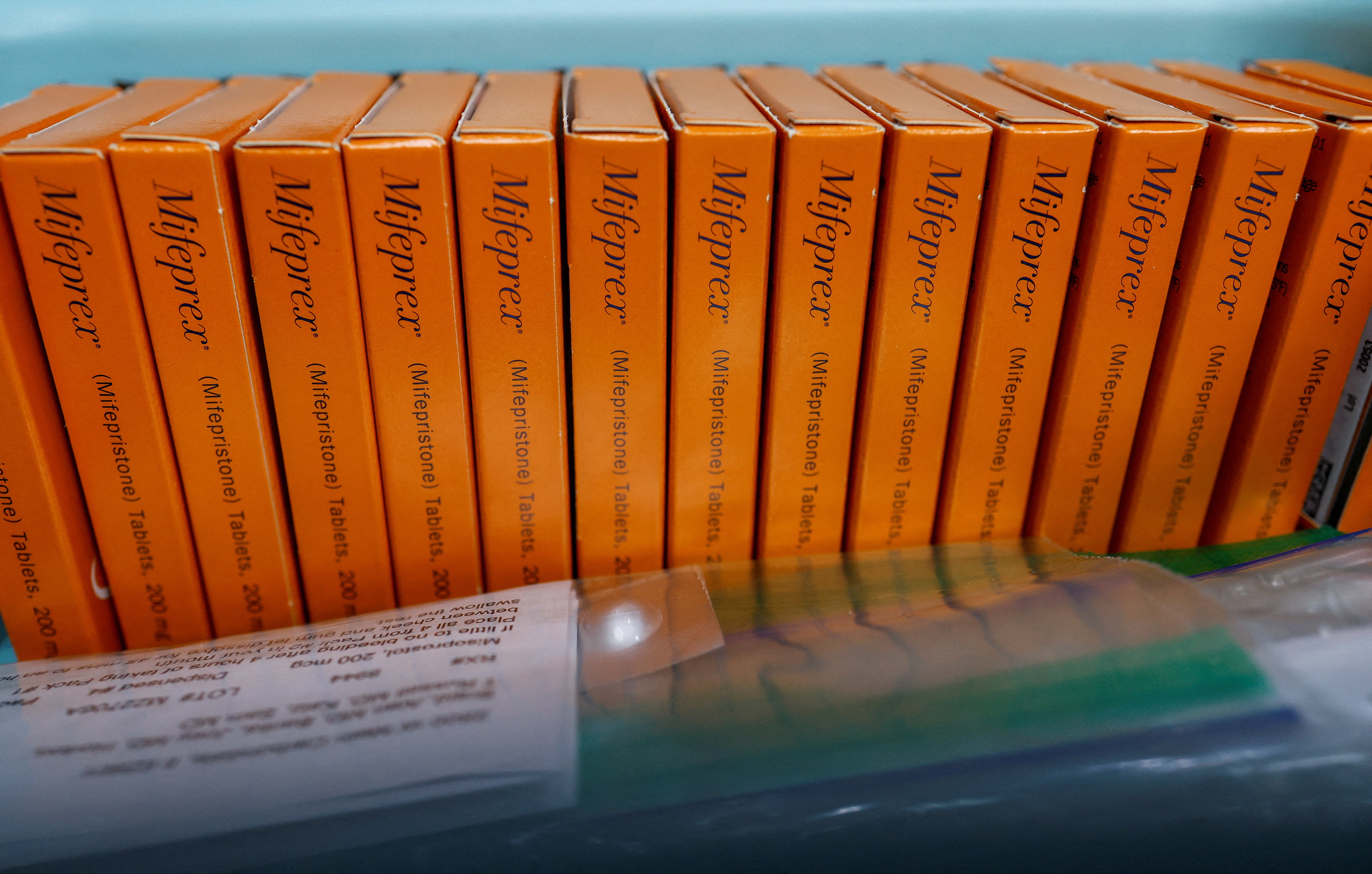US pharmacy chains will offer abortion drug as Supreme Court prepares to hear major post-Roe case
Justices will hear oral arguments in a case that could revoke approval of a widely used pill that accounts for more than half of all abortions in the US
Major pharmacy retailers Walgreens and CVS will begin offering the abortion pill mifepristone as early as next week in stores across the US, a move that could significantly expand access to abortion care as the US Supreme Court once again prepares to hear a case that could radically restrict reproductive healthcare for millions of Americans.
Mifepristone is one of two drugs in a two-drug protocol for medication abortion, a procedure that accounts for more than half of all abortions in the US
The drug, which is only available with a prescription, was first approved for use by the US Food and Drug Administration in 2000. The pill blocks a hormone necessary for pregnancy development, and is followed by the pill misoprostol, which causes contractions to expel tissue.
That same regimen is also used in miscarriage treatment.
A phased rollout of the drug’s availability in two of the largest pharmacy chains in the US arrives just weeks before the Supreme Court prepares to hear oral arguments in a case from right-wing legal groups and anti-abortion activists seeking to revoke the FDA’s approval, part of a years-long campaign to outlaw abortion nationwide.
That case comes before the court less than two years after a decision in Dobbs v Jackson Women’s Health Organization, which overturned a constitutional right to abortion care affirmed in Roe v Wade nearly 50 years earlier.
Patchwork anti-abortion laws across the country have choked off abortion access or effectively outlawed abortion care entirely; mifepristone prescriptions from CVS and Walgreens will only be available in states where abortion is legal.
But “many women will soon have the option to pick up their prescription at a local, certified pharmacy – just as they would for any other medication,” President Joe Biden said in a statement on Friday.
“I encourage all pharmacies that want to pursue this option to seek certification,” he added.
The president is pledging to defend the FDA under scrutiny at the Supreme Court, and has repeatedly vowed to “restore” Roe v Wade protections into federal law, if Congress can pass legislation to do so.
“Our administration will not waver in our dedication to preserving access to essential medication and defending the FDA’s independent, evidence-based approval and regulation of safe and effective drugs,” Vice President Kamala Harris said in a statement.

Medication aborion accounts for roughly 54 per cent of all abortions, according to the Guttmacher Institute. A vast majority of abortions occur within the first nine weeks, according to the US Centers for Disease Control and Prevention. In 2019, nearly 93 per cent of all abortions were performed before the 13th week.
Right-wing legal group Alliance Defending Freedom – which also led the Supreme Court challenge to strike down Roe v Wade – filed a lawsuit in 2022 on behalf of a group of anti-abortion activists to revoke the FDA’s approval of mifepristone.
US District Judge Matthew Kacsmaryk – a former right-wing activist lawyer who was appointed to the federal judiciary by Donald Trump – issued a ruling to suspend the FDA’s approval of mifepristone.
The conservative Fifth Circuit Appeals Court in Louisiana largely upheld the ruling, and an appeal to the Supreme Court set the stage for the case to be heard on 26 March.
A major medical journal retracted two papers from 2021 and 2022 that the plaintiffs cited in their case to the nation’s high court, throwing into doubt any medical basis for their position, while anti-abortion groups, Republican officials from 25 states and more than 140 members of Congress have signed briefs with the Supreme Court to block mifepristone’s availability.
In their brief to the court, attorneys for Alliance Defending Freedom have argued that anti-abortion doctors will violate their religious beliefs if they provide care to patients who experience complications from a medication abortion.
A ruling that undermines the FDA’s drug approval process could also open the door for other activist-driven legal battles over other drugs, potentially inviting other destabilising lawsuits to Covid-19 vaccines, contraception, HIV medication, gender-affirming care, and other life-saving drugs.
Evan Masingill of GenBioPro – the nation’s only generic manufacturer of mifepristone – called a decision from pharmacy retailers “a significant step toward making our company’s belief that all people, regardless of income, gender, race, or geography, have a right to access evidence-based health care and safe and effective medicines – including medication abortion – a reality.”
Serra Sippel, interim executive director of The Brigid Alliance, which provides practical support for people seeking abortion care, said mifepristone’s expanded access “will reduce unnecessary delays to accessing care, and potentially the number of women who will be forced to travel out of state.”
“But while we praise this announcement, we must recognize that across the country, hundreds of thousands of pregnant people who live in states where abortion is banned and mifepristone is illegal will not be impacted by this decision,” she added. “And even in places with strong laws protecting abortion rights, people still struggle to access abortion care due to stigma, misinformation, a lack of providers, high costs, and much more.”
Join our commenting forum
Join thought-provoking conversations, follow other Independent readers and see their replies
Comments
Bookmark popover
Removed from bookmarks